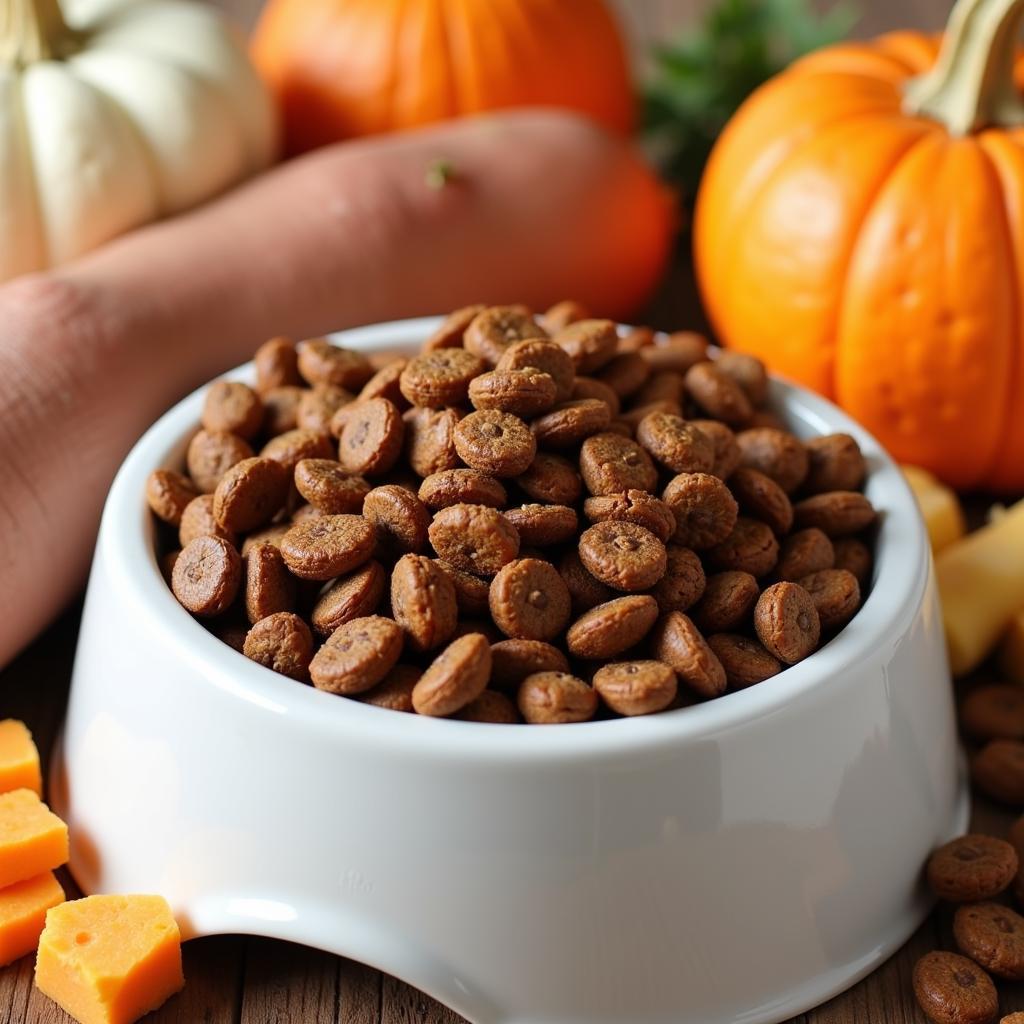Switching to “No Potato Dog Food” might seem trendy, but it often stems from genuine concerns about allergies and digestive sensitivities. While potatoes are generally considered safe for dogs, some pups might experience adverse reactions. This guide delves into the reasons behind choosing potato-free options and helps you navigate the world of grain-free alternatives.
Why Consider No Potato Dog Food?
Potatoes, a common ingredient in many commercial dog foods, offer carbohydrates for energy. However, some dogs might benefit from eliminating them due to:
- Allergies: Just like humans, dogs can develop allergies to various ingredients, including potatoes. Symptoms like itching, skin irritation, gastrointestinal upset, and ear infections might indicate a potato allergy.
- Sensitivity: Some dogs have sensitive stomachs that react poorly to certain ingredients. Potatoes, especially in large amounts, can trigger digestive issues like gas, bloating, or diarrhea.
- Weight Management: Potatoes are starchy and calorie-dense. For dogs prone to weight gain or those needing weight control, potato-free options can be beneficial.
Exploring Grain-Free Alternatives
Opting for “no potato dog food” often goes hand-in-hand with choosing grain-free options. Here’s a closer look at common alternatives:
- Sweet Potatoes: Unlike potatoes, sweet potatoes are a good source of dietary fiber, which aids digestion. They are also rich in vitamins A and C, supporting overall health.
- Pumpkin: Another excellent source of fiber, pumpkin can help regulate digestion and promote healthy bowel movements.
- Peas & Lentils: These legumes offer a good source of protein and carbohydrates, making them a valuable addition to grain-free dog food.
 Grain-Free Dog Food Options
Grain-Free Dog Food Options
Choosing the Right No Potato Dog Food
Navigating the world of dog food can be overwhelming. Here’s what to keep in mind when choosing “no potato dog food” for your furry friend:
- Read the Label: Look for dog food that clearly states “potato-free” or “no potato.” Pay close attention to the ingredient list to ensure no potato derivatives are included.
- Prioritize High-Quality Protein: Opt for dog food with real meat or fish as the primary ingredient. Avoid products with vague protein sources like “meat by-products.”
- Consider Your Dog’s Needs: Factors like age, breed, activity level, and health conditions influence your dog’s nutritional requirements. Choose a formula tailored to their specific needs.
Transitioning to No Potato Dog Food
When transitioning your dog to a new food, gradual introduction is key:
- Start with a small amount: Mix a small portion of the new food with your dog’s current food.
- Gradually increase: Over 7-10 days, increase the ratio of new food while decreasing the old food.
- Monitor your dog: Watch for any signs of digestive upset, allergies, or changes in appetite.
Is No Potato Dog Food Right for Every Dog?
While “no potato dog food” offers benefits for some, it’s not a one-size-fits-all solution. If your dog thrives on a potato-containing diet and shows no signs of allergies or sensitivities, there might be no need to switch.
“Switching to a no potato diet can be beneficial for dogs with specific needs,” says Dr. Emily Carter, a certified veterinary nutritionist. “However, it’s essential to consult your veterinarian to determine the best dietary approach for your individual dog.”
Conclusion
Choosing the right food for your furry companion is crucial for their overall well-being. If you suspect your dog might benefit from a “no potato dog food” diet, explore grain-free alternatives and consult your veterinarian. With careful consideration and a gradual transition, you can help your dog thrive on a diet that meets their individual needs.
For those looking for high-quality, grain-free options, consider exploring our selection of 15 lb dog food or nature fresh dog food.
FAQs
1. What are the signs of potato allergy in dogs?
Common signs include itching, skin irritation, digestive issues like vomiting or diarrhea, and ear infections.
2. Can I make homemade no potato dog food?
Yes, but it’s crucial to consult a veterinary nutritionist to ensure a balanced and complete diet for your dog.
3. Are sweet potatoes a good alternative to potatoes in dog food?
Yes, sweet potatoes are a nutritious and easily digestible alternative to potatoes.
4. What should I do if my dog experiences digestive issues after switching to no potato dog food?
Consult your veterinarian. They can help determine the cause and recommend adjustments to your dog’s diet.
5. Where can I find reputable brands of no potato dog food?
Look for brands that prioritize high-quality ingredients, have transparent labeling practices, and are recommended by veterinarians. You can also explore our star pro dog food options.
Common Concerns
My dog has always eaten potato-based dog food and seems fine. Do I need to switch?
If your dog is healthy and shows no signs of allergies or sensitivities, there might be no need to switch. However, consulting your veterinarian can help determine if a no potato diet might be beneficial.
I’m concerned about the cost of no potato dog food. Are there affordable options available?
While no potato dog food might be slightly more expensive, affordable options are available. Prioritize quality over quantity and consult your veterinarian for recommendations.
My dog is a picky eater. Will they accept a no potato diet?
Transitioning gradually and adding flavorful toppers like crock pot dog food with ground turkey or impossible burger dog food can encourage picky eaters to accept a new diet.
Need more support? Contact us at Phone Number: 02437655121, Email: minacones@gmail.com or visit us at 3PGH+8R9, ĐT70A, thôn Trung, Bắc Từ Liêm, Hà Nội, Việt Nam. We have a 24/7 customer support team.